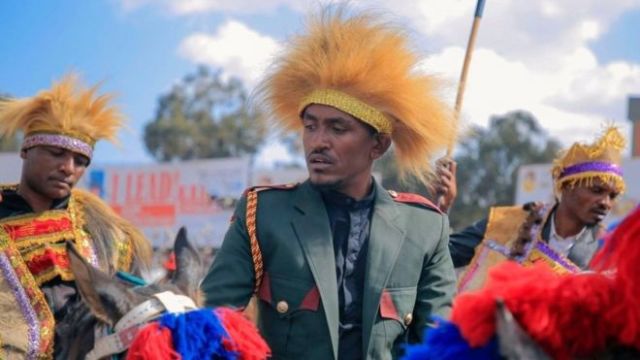 A former political prisoner who grew up looking after cattle, Hachalu Hundessa rose to become one of Ethiopia's biggest music stars, mesmerising fans with his songs about romance and political freedom - topics that he easily blended into his lyrics. (DAGI PICTURES)
A former political prisoner who grew up looking after cattle, Hachalu Hundessa rose to become one of Ethiopia's biggest music stars, mesmerising fans with his songs about romance and political freedom - topics that he easily blended into his lyrics. (DAGI PICTURES)
BBC
More than 80 people have been killed in two days of unrest in Ethiopia following the killing of prominent singer Hachalu Hundessa.
The 34-year-old had emerged as a powerful political voice of the Oromo ethnic group, and had made many enemies during his musical career.
Two suspects were arrested after he was shot dead while driving in the capital, Addis Ababa on Monday evening. However, police have not yet revealed a motive for the killing and no charges have been brought against the suspects.
Hachalu’s funeral has taken place in his hometown of Ambo.
BBC Afaan Oromoo’s Bekele Atoma writes about the musician who was a thorn in the flesh of successive governments.
A former political prisoner who grew up looking after cattle, Hachalu rose to become one of Ethiopia’s biggest music stars, mesmerising fans with his songs about romance and political freedom – topics that he easily blended into his lyrics.
Hachalu’s father, who used to work in the electricity department in the city of Ambo, aspired for his son to become a doctor, but he showed little interest in medicine.
However, from an infant, Hachalu showed a passion for music and singing, with the encouragement of his mother, while he looked after cows on the family’s farmland on the outskirts of Ambo in the Oromia region, the heartland of Ethiopia’s largest ethnic group, the Oromo.
“I used to sing whatever came to my head,” he recalled in a BBC Afaan Oromoo interview in 2017.
Jailed for five years
One of eight children, Hachalu was born in 1986 in Ambo – a city about 100km (60 miles) west of the capital, Addis Ababa.
It was at the forefront of the campaign by Oromos for self-rule in a nation where they felt repressed under a government that had banned opposition groups and jailed critics.
Hachalu went to school in Ambo, and joined student groups campaigning for freedom.
At the age of 17 in 2003, Hachalu was imprisoned for five years for his political activities.
His father kept his morale high in prison, telling him during visits that “prison makes a man stronger”.
Hachalu became increasingly politicised in prison, as he increased his knowledge about Ethiopia’s history, including its rule by emperors and autocrats.
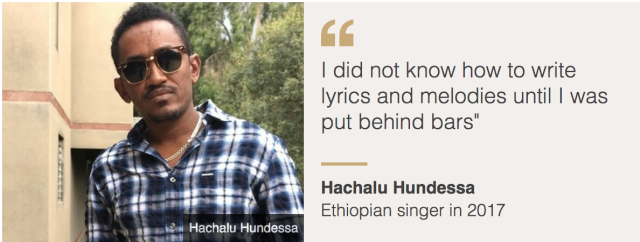
Whilst incarcerated in Ambo prison he also developed his music skills.
“I did not know how to write lyrics and melodies until I was put behind bars. It is there that I learned,” he said in the 2017 interview.
During his time in jail, he wrote nine songs and released his first album Sanyii Mootii (Race of the King) in 2009, a year after walking free.
Refused to go into exile
The album turned him into a music star, and a political symbol of the Oromo people’s aspirations.
However, he played down his political role, saying: “I am not a politician, I am an artist. Singing about what my people are going through doesn’t make me a politician.”
Many other musicians and activists fled into exile fearing persecution under the rule of then-Prime Minister Meles Zenawi and his successor Hailemariam Desalegn but Hachalu remained in Ethiopia and encouraged the youth to stand up for their rights.
One of his songs was about how he fell in love with a girl who was proud of her identity and was willing to die for it.
‘Gallant warriors and horsemen’
His second album Waa’ee Keenya (Our Plight) was released in 2013 while he was on a tour in the US. It became the best-selling African album on Amazon at the time.
Two years later, he released a powerful single, Maalan Jira? (What existence is mine?), referring to the eviction of Oromos from Addis Ababa and its surrounding areas, after the government decided to expand the boundaries of the city.
—
Turmoil at Funeral of Singer Shows Ethiopia’s ‘Combustible’ Politics (NYT)
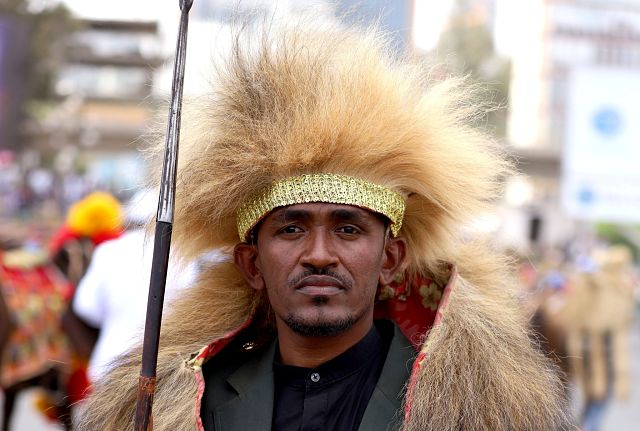
At least 81 people have been killed and dozens injured in the unrest that followed the killing of Hachalu Hundessa, underscoring long-simmering tensions in [Ethiopia]. (Photo: Musician Hachalu Hundessa posing while dressed in a traditional costume in Addis Ababa in 2019/Tiksa Negeri/Reuters)
The New York Times
By Abdi Latif Dahir and Tiksa Negeri
July 2, 2020
NAIROBI, Kenya — In life, Hachalu Hundessa’s protest songs roused and united Ethiopians yearning for freedom and justice. He is doing the same in death, with thousands flocking on Thursday to bury him in Ambo, the town 60 miles west of the Ethiopian capital of Addis Ababa where he was born and raised.
Mr. Hundessa, 34, was shot on Monday night by unknown assailants in Addis Ababa and later died of his wounds in a hospital. His death has ignited nationwide protests that have killed 81 people, injured dozens of others and caused extensive property damage. The authorities have blocked the internet and arrested 35 people, including a prominent media magnate and government critic, Jawar Mohammed.
On Thursday, groups of young men, some with machetes, roamed through neighborhoods in Addis Ababa, singling out people from rival ethnic groups for attacks. And in Ambo, witnesses said that the police blocked some people from attending the singer’s funeral, even firing shots at them.
The unrest, analysts say, threatens the stability of Africa’s second-most populous country and deepens the political crisis in a nation already undergoing a roller-coaster democratic transition.
“I am in bitter sadness,” said Getu Dandefa, a 29-year-old university student. When he saw Mr. Hundessa’s coffin in Ambo, he said he dropped to the ground and started crying.
“We lost our voice,” he said, “We will keep fighting until Hachalu gets justice. We will never stop protesting.”
Mr. Hundessa’s funeral has brought tensions to a boiling point in a country already facing myriad political, economic and social challenges. The fury aroused by his death poses a challenge to Prime Minister Abiy Ahmed, who rose to power in 2018 following a wave of antigovernment protests that Mr. Hundessa — a member of the country’s largest but historically marginalized ethnic group, the Oromo — helped to galvanize through his music.
Since then, Mr. Abiy, an Oromo himself, has introduced a raft of changes aimed at dismantling Ethiopia’s authoritarian structure, releasing political prisoners, liberalizing the centralized economy, committing to overhaul repressive laws and welcoming back exiled opposition and separatist groups.
In 2019, Mr. Abiy was awarded the Nobel Peace Prize for his initiative to resolve the decades-long conflict with neighboring Eritrea and for spearheading regional peace and cooperation in the Horn of Africa.
A nation of about 109 million people, Ethiopia has one of the fastest-growing economies in Africa, hosts the headquarters of the African Union, and is a key United States ally in the fight against terrorism.
But while the 43-year-old prime minister has made great strides, the changes have unleashed forces that have produced a sharp increase in lawlessness in many parts of the country, with rising ethnic tensions and violence that have displaced 3 million people.
Yohannes Gedamu, an Ethiopian lecturer in political science at Georgia Gwinnett College, in Lawrenceville, Ga., said that the ruling coalition had lost its grip on the structures it once used to maintain order in an ethnically and linguistically diverse nation. As a result, he added, as the country moves toward multiparty democracy, rival ethnic and political factions have clashed over resources, power and the country’s direction forward.
The government has come under fire for failing to stop the killing of government critics and prominent figures, like the chief of staff of the Ethiopian Army, and its inability to rescue a dozen or more university students abducted months ago.
In combating the disorder, the authorities have resorted to the tactics of previous, repressive governments, not only blocking the internet, but arresting journalists and enacting laws that human rights advocates say could limit freedom of expression. Ethiopian security forces have been accused of gross human rights violations, including rape, arbitrary arrests and extrajudicial killings.
The coronavirus pandemic has complicated all this, leading the government to postpone August elections that many saw as a critical test of Mr. Abiy’s reform agenda. The move drew condemnation from opposition parties, who fear the government will use the delay to attempt a power grab.
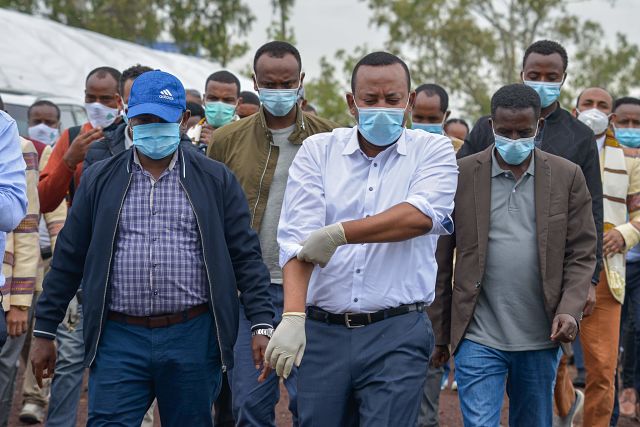
Prime Minister Abiy Ahmed at a tree-planting ceremony last month. The fury the death of Mr. Hundessa touched off poses a challenge to Mr. Ahmed, who rose to power in 2018 following a wave of antigovernment protests.Credit…Michael Tewelde/Agence France-Presse — Getty Images
“The last few days demonstrate just how combustible the situation in Ethiopia is,” said Murithi Mutiga, the project director for the Horn of Africa at the International Crisis Group.
He added: “The merest spark can easily unleash all these bottled up, ethnonationalist passions that have become the defining feature of Ethiopian politics, especially as it goes through this very delicate transition.”
While Mr. Abiy has a daunting task at hand, many say the government’s forceful response to the recent discontent could make matters worse. Laetitia Bader, the Horn of Africa director at Human Rights Watch, said the group had received reports that security forces had used lethal force on protesters in at least seven towns.
“The initial signs aren’t good,” Ms. Bader said. “The government needs to make clear that it is listening to these grievances, creating the space for them to be heard and adequately responding to them without resorting to repression or violence.”
Given Mr. Hundessa’s stature, and how his music provided a stirring soundtrack against repression, the authorities should pull back and allow “people to grieve in peace,” said Henok Gabisa, the co-chairperson of the International Oromo Lawyers Association, based in St. Paul, Minn. About 200 of the city’s Oromo community protested on Tuesday.
“The Oromo people are in disbelief, shocked and confused,” said Mr. Gabisa, who knew Mr. Hundessa and met him a few months ago in Ethiopia. But arresting political opposition leaders like Bekele Gerba, of the Oromo Federalist Congress party, and raiding Mr. Mohammed’s Oromia Media Network only risked inflaming long-simmering tensions, he said.
Related:
Six hurt in scuffles with security forces at Ethiopian singer’s funeral (Reuters)
Haile Selassie: Statue of former Ethiopian leader destroyed in London park (BBC)
—
‘Several’ Killed in Ethiopia Unrest After Singer Shot Dead (The Associated Press)
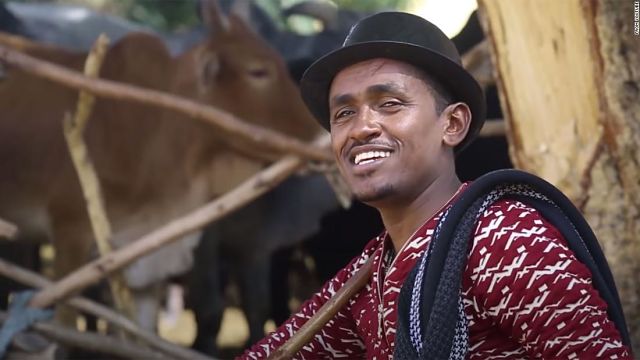
Hachalu Hundessa, well known for his political songs, was shot dead on Monday in Addis ababa. The 34-year-old had been a prominent voice in anti-government protests that led to a change in leadership in 2018, with Prime Minister Abiy Ahmed taking office. (Photo: YouTube music video screenshot)
The Associated Press
By ELIAS MESERET
Updated: July 1st, 2020
Ethiopia’s prime minister says “several people” have been killed in unrest that followed the killing of a popular singer this week.
Angry protests were reported Tuesday in the capital, Addis Ababa, after Hachalu Hundessa was shot dead on Monday. He had been a prominent voice in anti-government protests that led to a change in leadership in 2018, with Prime Minister Abiy Ahmed taking office.
The killing was a “tragedy,” Abiy said Tuesday, vowing that the perpetrators would be brought to justice and declaring that “our enemies will not succeed.”
Three bombs exploded in the capital Tuesday, police said. It was not clear whether anyone was killed.
Internet service has been cut again in Ethiopia, where tensions continue after the government delayed this year’s national election, citing the coronavirus pandemic.
The singer Hachalu is set to be buried Thursday in his hometown in the Oromia region.
A well-known Oromo activist, Jawar Mohammed, was among 35 people arrested during the latest unrest.
There was no immediate sign of protests in Addis Ababa on Wednesday and roads were empty.
—
Internet cut off in Ethiopia amid outcry over death of singer-activist
By Bethlehem Feleke, CNN
Updated: June 30th, 2020
(CNN) Internet access was cut across Ethiopia on Tuesday amid national protests over the shooting death of singer and activist Hachalu Hundessa.
Hachalu, a prominent figure in the Oromo ethnic group, was shot Monday night at the Gelan Condominiums area of the capital Addis Ababa, according to state broadcaster EBC citing the Addis Ababa police commissioner, Getu Argaw.
On Tuesday, images of protesters in the capital and in Oromia region circulated on social media and the US Embassy in Ethiopia released a security alert saying the embassy was “monitoring reports of protests and unrest, including gunfire, throughout Addis Ababa.”
Demonstrators also protested the singer’s death in front of the US embassy, the alert said, describing the situation as “volatile at this time.”
A blanket shutdown
Netblocks, an internet-monitoring NGO, reported that internet “has been cut across most of Ethiopia from just after 9am local time on Tuesday.”
—
Hachalu Hundessa: Killing of Ethiopian singer sparks unrest (DW)
Hachalu Hundessa — famed for his political songs — had been considered a voice for Ethiopia’s largest ethnic group, the Oromo, during years of anti-government protest. Heavy violence has been reported after his killing.
Deeply saddened & shocked by the death of Hachalu Hundessa. We have lost a truly great young artist. My thoughts & prayers are with Hachalu’s family & friends
በአርቲስት ሃቻሉ ሁንዴሳ መቀጠፍ እጅግ አዝነናል:: ለቤተሰቦቹ እና ለወዳጅ ዘመዶቹ መጽናናትን እንመኛለን
— Fitsum Arega (@fitsumaregaa) June 30, 2020
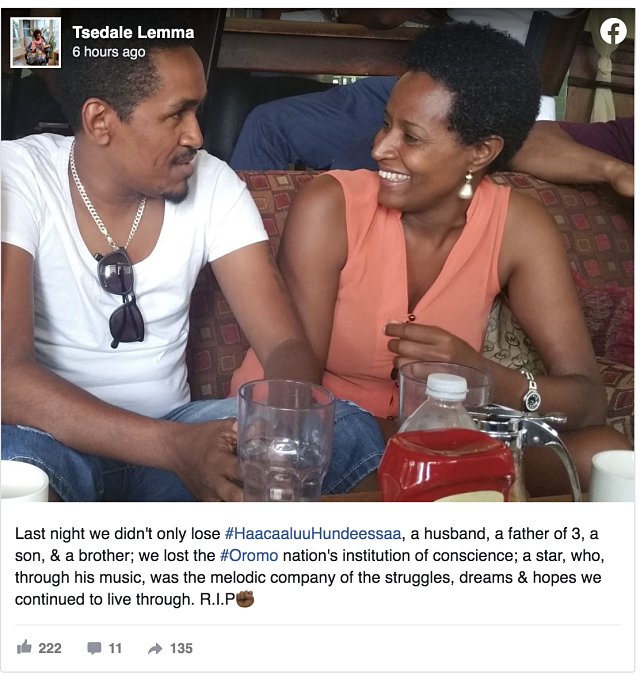
‘Voice of a generation’
The context to the singer’s death was not immediately clear, although the embassy said Hundessa’s supporters had blamed security forces and “assume a political motive” for the crime.
Ethiopia’s prime minister, Abiy Ahmed, expressed his condolences and tweeted that an investigation was currently under way.
Hundessa in 2017 was described by OPride.com as an “electrifying voice of a generation that is revolting” after being awarded the portal’s Oromo Person.
“For capturing and expressing the frustration, anger, and hope of Oromo protesters through revolutionary lyrics; for courageously defying forcible suppression of dissent and boldly proclaiming ‘we are here and not going anywhere’; for providing a stirring soundtrack to the budding Oromo revolution; for breaking down fear and structural barriers through rousing musical storytelling, and for uniting the Oromo masses and amplifying their collective yearning for change, Haacaaluu Hundeessaa is OPride’s Oromo Person of 2017.”
The Oromo, Ethiopia’s largest ethnic group, had taken to the streets to complain about what they perceive as marginalization and persecution by the central government.
Oromo protests made international headlines when Ethiopian long-distance runner Feyisa Lilesa — a member of the Oromo community — reached the finishing line raising his crossed hands at the Rio 2016 Olympics. The crossed hands have become the symbol of the anti-government movement that started in the Oromia region and spread north to the Amhara region.
Ethiopia is no stranger to ethnic violence. With over 80 different ethnic groups and Africa’s second-largest country based on population, the country is extremely diverse and disagreements between various groups often spiral into communal violence.
kw/stb (dpa, Reuters)
—
‘More than an entertainer’
By Bekele Atoma, BBC Afaan Oromo
Updated: June 30th, 2020
Hachalu was more than just a singer and entertainer.
He was a symbol for the Oromo people who spoke up about the political and economic marginalisation that they had suffered under consecutive Ethiopian regimes.
In one of his most famous songs, he sang: “Do not wait for help to come from outside, a dream that doesn’t come true. Rise, make your horse ready and fight, you are the one close to the palace.”
The musician had also been imprisoned for five years when he was 17 for taking part in protests.
Many like him fled into exile fearing persecution but he remained in the country and encouraged the youth to struggle.
—
Hachalu Hundessa: Popular Ethiopian protest singer shot dead (BBC)
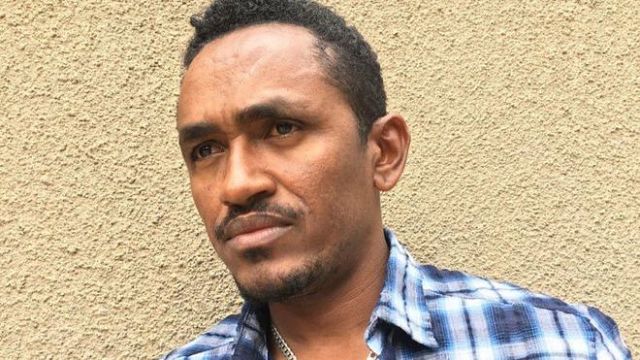
Musician Hachalu Hundessa was killed in Addis Ababa on Monday, June 29th, 2020. (BBC)
BBC News
Updated: June 30th, 2020
Ethiopian musician Hachalu Hundessa, well known for his political songs, has been shot dead in the capital
The 34-year-old had said that he had received death threats and the police are now holding a number of suspects.
Hachalu’s lyrics often focused on the rights of the country’s Oromo ethnic group and became anthems in a wave of protests that led to the downfall of the previous prime minister.
Demonstrations broke out in response to the news of the musician’s death.
Gunshots have been heard in Addis Ababa and people set fire to tyres.
Thousands of his fans headed to the hospital in the city where the body of the singer was taken on Monday night, BBC Afaan Oromo’s Bekele Atoma reports.
To them, he was a voice of his generation that protested against decades of government repression, he says.
Police used tear gas to disperse the crowd.
The internet was also shut down in parts of the country as protests spread in Oromia regional state.
Hachalu’s body has now been taken to the town of Ambo, about 100km (62 miles) west of the capital.
Prime Minister Abiy Ahmed has expressed his condolences saying in a tweet that Ethiopia “lost a precious life today” and describing the singer as “marvellous”
—
Popular Ethiopian singer Hachalu Hundessa shot dead in Addis Ababa (Al Jazeera)
Updated: June 30th, 2020
A popular Ethiopian musician has been shot dead in the country’s capital, Addis Ababa, local media reported, quoting police. He was 36.
Hachalu Hundessa, an ethnic Oromo also known as Haacaaluu Hundeessaa, was shot in the city’s Gelan Condominiums area late on Monday, Addis Ababa’s police commissioner said.
Geta Argaw said police had arrested several suspects, state-affiliated Fana broadcaster reported on Tuesday.
Prime Minister Abiy Ahmed expressed his condolences, saying Ethiopia had “lost a precious life”.
“I express my deep condolences for those of us who are in deep sorrow since the news of the death of the shining young Artist Hachalu Hundesa,” Fana reported the prime minister as saying. “We are expecting full investigation reports of this evil act.”
“Let us express our condolences by keeping ourselves safe and preventing further crime,” Abiy said.
Ethiopians on social media, including the country’s ambassador to Washington, expressed their shock at the killing of the popular musician.
On Tuesday, youths enraged by the killing of the musician, who was known for his protest songs, burned tyres during demonstrations in Addis Ababa.
Hachalu, a former political prisoner, rose to prominence during prolonged anti-government protests, which propelled Abiy, a fellow Oromo, into office in 2018. Oromo ethnic group, which have historically faced discrimination, led the the mass protests.
Abiy’s rise to power ended decades of political dominance by ethnic Tigray leaders in this multi-ethnic African nation.
His rule has ushered in greater political and economic freedoms in what had long been one of the continent’s most repressive states. He was awarded the 2019 Nobel Peace Prize for ending conflict with neighbouring Eritrea and his reforms.
But the rise in political activism has also led to an increase in unrest in a country made up of more than 80 ethnic groups. Abiy’s rule has been frequently challenged by local powerbrokers demanding more access to land, power and resources.
His pan-Ethiopian politics have sparked a backlash from some elements of his own Oromo powerbase, spearheaded by a media magnate, Jawar Mohammed.
“They did not just kill Hachalu. They shot at the heart of the Oromo Nation, once again !!…You can kill us, all of us, you can never ever stop us!! NEVER !!” Jawar posted on his Facebook page on Tuesday.
Clashes between police and Jawar’s supporters killed at least 78 people in October last year after the government tried to withdraw Jawar’s security detail.
Elections due this year have been postponed until next year due to COVID-19 in a deal agreed with the major opposition parties.
—
Join the conversation on Twitter and Facebook.

























